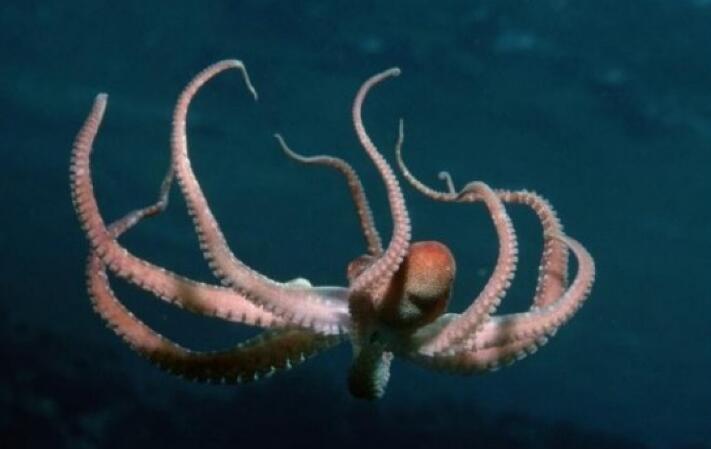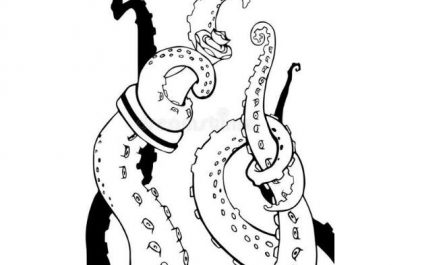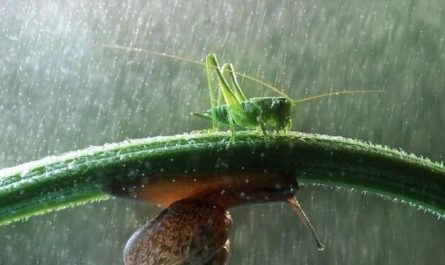When talking about what marine animals are smarter, people first think of dolphins. This is not bad at all. Dolphins are indeed the most powerful brain in marine animals. But there is another animal whose cleverness is often underestimated, that is, the octopus that often appears on people’s tables.
How smart are octopuses? It may scare many friends to say it: octopus has three hearts and two memory systems, plus a special neuron configuration, is considered to be the smartest animal among mollusks, and its wisdom is not lower than that of dolphins. It is said that it is also compatible with dolphins. Like the dolphins, they passed the mirror experiment.
The so-called mirror experiment is one of the methods to test whether animals have self-awareness. It is to let the animal look in the mirror through a certain method. If you know that you are yourself in the mirror, it means that the animal has a certain sense of self. Self-awareness is the foundation of thinking and memory. Therefore, animals with self-awareness will definitely be smarter than animals without self-awareness.
Very few animals have passed the mirror experiment. Our old human friends, dogs and cats, have not passed this experiment. They look in the mirror and don’t know that the silly look is themselves. The octopus is one of the animals that passed this experiment at the same time as dolphins and certain whales.
Now let’s take a look at how smart this Octopus is.
Complex cognitive test
This experiment is called the “marshmallow experiment”. The general process is: scientists gather a group of children, put a marshmallow in front of each person, and tell them that you can eat this marshmallow at any time, but if it takes 15 minutes for me If you haven’t eaten it when you come back, you will get two marshmallows.
Most children did not resist the temptation of marshmallows and ate them before the scientists came back. Now the test of octopus begins.
Scientists have trained octopuses to know that if they can resist eating a piece of marshmallow, they will get two pieces of marshmallow when they come back later. As a result, the octopuses held back and waited until the scientists returned, and they got more marshmallows. This shows that octopuses have certain cognitive abilities and children whose intelligence is at least six or seven years old, which allows them to choose a “living method” that is more beneficial to them in their living environment.
Octopus body structure
As an invertebrate, octopus is similar to humans, except that its eyes are similar to humans. The other structures of the body are completely different from vertebrates such as humans and dolphins. The neurons of humans and dolphins are mainly concentrated in the brain, making decisions through the brain, and then transmitting information through the spinal nervous system. Command the whole body tissues and organs to perform various functions and actions. Octopus does not have a spinal cord, but has 500 million neurons, while brain neurons account for only about 40%, and the remaining 60% neurons are distributed throughout the body.
There are 500 million neurons in the octopus brain, each arm and foot has a large number of neurons, there are also very sensitive chemical and tactile receptors, there are three hearts, two memory systems (one is the brain memory system, the other is directly Connected to the suction cup). The unique neural structure of octopus makes them have extraordinary thinking ability.
So some people think that octopuses have 9 brains. In this sense, each arm, leg, and even each sucker of an octopus has the ability to think independently, and can decide what to do without using the brain.
There are many kinds of octopus, all over the temperate tropical waters
There are 26 genera and 252 species of octopus, belonging to marine mollusks. These octopuses vary greatly in size, with the smallest being only a few centimeters long and weighing a few grams; the larger ones are more than ten meters, tens or even hundreds of kilograms. They basically live in the crevices of rocky caves on the seabed in tropical or temperate zones, and do not like to go out. They hibernate in the dark, and when they find their prey appears, they will be deadly with lightning speed.
Octopus is a cephalopod. It has only a head and arms, and the dividing line is not obvious. It has no trunk. It usually crawls with arms and legs. Sometimes it swims through the expansion and contraction of the intercarpal membrane. There is a funnel-shaped spray hole on the head. It can let itself through a rapid jet of water. Retreat quickly.
The octopus’s ability to attack and escape
When people cut off one of the arms and legs of an octopus, it also has the ability to attack. In some parts of the world, there is a habit of eating octopuses alive, and there have been cases where diners were killed by octopuses that were eaten into their stomachs. These octopuses were unwilling to be swallowed alive. The arms and legs that entered the esophagus were sucked into the esophagus and tried to crawl out. As a result, they blocked the trachea and made people suffocated.
One such case occurred in South Korea, where a woman suffocated to death while eating octopus alive. As a result, his boyfriend was charged. After investigation and inspection, it was determined that his girlfriend died of eating octopus, and his boyfriend was acquitted.
The octopuses in the aquarium often escape from their own tanks, enter other tanks to eat fish and shrimps, and sneak back to their nests before people find them. Some people have also discovered a close relative of the octopus called the octopus octopus. Its cubs will pull off the poisonous cap jelly and attach it to their own suckers. They can swish freely like a poisonous sword to resist and attack.
Therefore, it is not easy for people to lock an octopus. It can find a solution through complex thinking and escape from a small gap. There is a story of an octopus successfully “breaking out of prison” in New Zealand. This octopus, which was originally in the aquarium comfortably, was bored one day and wanted to go back to the sea, so it quickly found the drainage outlet. After passing through the 50-meter long pipe, it successfully returned to the sea to gain freedom. .
The “complex thinking” of octopus
Jim Cosgrove, an expert in octopus research for many years, believes that octopuses have “conceptual thinking.” Scientists once put a cork in a glass bottle containing a lobster in the water. Octopus grabbed the bottle and fiddled with it, and soon knew that it had to remove the stopper to eat the lobster inside. It sucked the stopper with its arms and legs and shook it constantly, and quickly opened the stopper. The lobster hiding in the bottle finally did not escape the bad luck of being eaten.
People put an octopus into a glass bottle and screwed the cap tightly. The octopus thought calmly for a while, then sucked the cap with its arms and legs and unscrewed it vigorously, and successfully escaped. An octopus named Otto in Germany was recorded multiple times escaping from the water tank and spraying water on the overhead light, causing the entire laboratory to short-circuit and cut off power.
In some places, people found traps arranged by octopuses and placed bait in the traps to let stupid lobsters fall into the urn to eat. People also found that octopuses would run with two legs on a snail shell to escape in an emergency. This phenomenon surprised some biologists. Are they learning from humans or animals that walk on two legs in the ocean? It is a bit scary to think about it. Of course, some scientists believe that this is their instinct and ability.
Octopus is still a master of stealth change
Octopus is also the most powerful stealth expert. Its ability to transform and stealth is much stronger than that of chameleons. It can transform its body into a similar appearance to the environment within a few seconds, so as to be invisible and confuse enemies or prey. This is due to the fact that there are three pigment cells in its skin, and its brain can control the random distribution and changes of these three pigments, thereby allowing itself to have thousands of changes.
In order to avoid the enemy’s hunting and killing, or to hunt down food, they will use all camouflage means, and sometimes even cut off their wrists to protect themselves. An American research team also photographed an octopus called Maginettes, which is only the size of an apple. When facing danger or encountering divers, it will bend and fold up six of its eight claws, disguising it as an octopus. It looks like a coconut shell, and the remaining two claws (arms and feet) will stand on the bottom of the sea, sneaking backwards, and taking refuge backwards, which is very funny.
Studies have found that the octopus genome has 30,000 sets of genes, while human genes have about 20,000~25,000. Therefore, octopus genes are much higher than that of humans. Does the more genes mean the higher the species? This has led to many discussions about octopuses. There is a view that octopuses are non-terrestrial species. They came to the earth by mistake due to some changes in the extraterrestrial civilization in the ancient times, and thus wronged them.
So are these octopuses really alien species, or even aliens?
They live in seclusion on the earth and try their best, just waiting for a comeback one day? At least there is no evidence so far. Perhaps the more advanced octopus ambushes in deep seafood and makes an appearance unknown? However, the octopus commonly seen by humans, no matter how cunning, cannot escape the clutches of humans, and always meets human food needs.
The octopus hunters take advantage of the octopus’s hobby of various utensils, get a variety of bottles and jars, and put them on the seabed where octopuses are often found with a long rope. After a while, they will be hidden inside. octopus. These octopuses who thought they had found free housing were fooled, so they did not come out. The fishermen would pour some salt into the jars, and these octopuses would escape like a fire.
From this point of view, although the cleverness of octopus is outstanding in the animal world, it is still a piece of cake in the eyes of humans.






